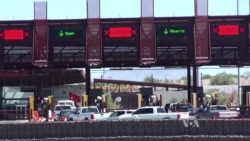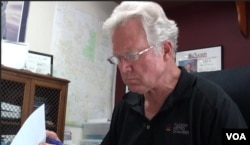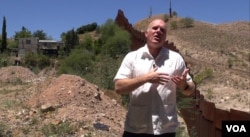Speaking at the Republican National Convention last Thursday, presidential candidate Donald Trump reiterated his plans to build a wall on the U.S.-Mexico border and end trade deals that he claims favor Mexico.
The Democratic Party’s presumptive presidential nominee, Hillary Clinton, has criticized such rhetoric and is expected to say more at her party’s convention this week. And last Friday, President Barack Obama hosted his Mexican counterpart, President Enrique Peña Nieto, to underscore the good relations between the two countries.
The benefits of cross-border commerce
Illegal immigration and drug trafficking are the issues most associated with the border in political debates and news reports, but there is also commerce and trade that supports jobs on both sides of the line.
On the border in Nogales, Arizona, cars and trucks line up all day long at the new Mariposa crossing station. Downtown, many Mexicans with visas come across to shop or work and then return across the border later. While about half of Mexico’s population lives below the poverty line, and wages are far lower than they are in the United States, the country has a growing middle class that looks for better bargains on clothes, appliances, electronic devices and other goods north of the border.
“Economic expansion and job growth just doesn’t have the sizzle that a drug bust does, but obviously we cherish the international trade that we enjoy here in Arizona and we want to do everything we can to expand that,” said Mike Varney, President and CEO of the Tucson Metro Chamber of Commerce.
Tucson, about 100 kilometers north of Nogales, draws a large share of the Mexican shoppers because of its large stores and other attractions, according to Varney.
“Mexican citizens come to the Tucson area and spend about a billion dollars a year in our stores and our hotels, buying all kinds of services and products here,” he told VOA.
NAFTA, border commerce and the immigration backlash
Even more important, according to Varney, are the cross-border manufacturing projects that have drawn corporations to establish their headquarters or regional offices in Tucson. Such economic activity has been spurred, in large part, by the North American Free Trade Agreement (NAFTA), which has lowered tariffs between the United States, Mexico and Canada since 1994.
But the treaty has drawn fire from critics on both the left and right for displacing some American workers and failing to bring wages in Mexico up anywhere close to the level of wages in the United States or Canada. While manufacturing in Mexico has grown, it still cannot provide enough jobs for the country’s large population of mostly young workers. As a result, Mexicans have continued to cross the U.S. border illegally seeking work opportunities. In their footsteps have come thousands of people from Central America, fleeing not just poverty, but drug-related violence.
Illegal immigration on the U.S.-Mexico border has created a backlash against undocumented immigrants whom critics deride for violating U.S. laws, committing crimes, taking jobs from U.S. workers and suppressing U.S. worker wages through their willingness to work for less. In Arizona, the frustration has been especially pronounced since the U.S. Border Patrol increased enforcement near major urban crossing zones like San Diego, California, and El Paso, Texas, causing more migrants to take their chances crossing over the border into Arizona.
Former Governor Jan Brewer, who backed controversial laws on immigration while in office, remains engaged with the issue, saying recently, "Our borders need to be secured, and we believe in the rule of law." The most outspoken public figure in Arizona is Maricopa County Sheriff Joe Arpaio, who spoke in favor of Donald Trump's proposed border wall at last week's Republican Convention.
Seeking balance at the border
But some Arizonans reject such views and the negative effects caused by what they call the “militarization of the border.” Reverend Randy Mayer, an immigrant advocate from Sahuarita, Arizona, said, “What happens here along the border is that commerce and business is almost stopped and what should be a multibillion dollar industry is actually suffering.”
Mike Varney does not paint the picture as bleakly, but he does see a need for balance between border security and the free flow of commerce.
“We want to keep bad people and bad things out of our country,” he said, “but, at the same time, we don’t want to put the brakes on cross-border trade.”
Varney argues that there are many entangled issues at the border that require clearheaded examination, not heated rhetoric.
“It’s a mix of politics, it’s a mix of trade and economy, it’s a mix of international relations,” he said, “so it is a complicated recipe and we need to pay attention to all the ingredients that go into that recipe.”








